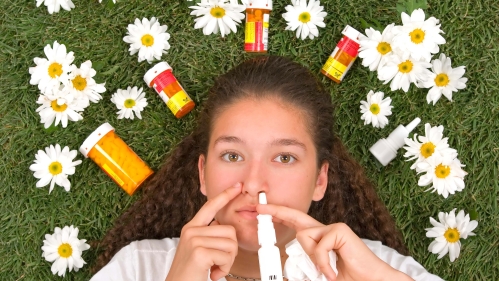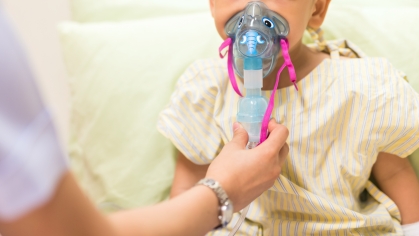All medicines, including antihistamines, carry risk of side effects, says Rutgers medical expert
People suffering from seasonal allergies turn to over-the-counter and prescription products for relief of common symptoms – coughing, sneezing, runny nose, congestion and itchy eyes, nose or throat – often aren’t aware of the potential side effects.
An estimated 1 million people are seen in U.S. hospital emergency departments for adverse drug events each year, and more than one-fourth are hospitalized, according to the Centers for Disease Control and Prevention.
“All medicines have side effects associated with them even when they are taken appropriately and according to dosing directions on the label,” said Diane Calello, executive and medical director of the New Jersey Poison Control Center at Rutgers New Jersey Medical School. “We want consumers to be aware of the potential side effects of over-the-counter and prescription allergy medicine, which can range from agitation to drowsiness to upset stomach or liver damage.”
All medicines, including antihistamines, carry risk of serious side effects. Over-the-counter medicines have the same potential for dangerous side effects, drug-to-drug interactions and overdose as prescription medicines, Calello said.
Anyone who takes medicines, including vitamins and supplements, is at risk for potentially harmful effects. Follow these safety tips to reduce your risk of injury when taking medicine (over-the-counter, prescription, vitamins and supplements):
- Lock medicine to prevent accidental poisoning. Because children and pets are curious, they are at an increased risk for accidentally ingesting medicines. This could lead to severe poisoning and life-threatening symptoms. Medicines are commonly mistaken for candy because they are small and colorful.
- Select medicines that treat only the symptoms you have. For example, use a decongestant if you are congested, but only use decongestants with cough suppressant if you have a cough as well.
- Be mindful that many medicines contain more than one ingredient, and some may even contain alcohol. Many ingredients used in medicine can interact dangerously with alcohol, causing side effects such as nausea, vomiting, drowsiness, fainting and/or loss of coordination. Keep in mind that these interactions can still occur even if they weren’t ingested at the same time.
- Watch for the same active ingredients in products taken at the same time. Many medicines contain the same active ingredients, even if they have different names and/or intended purposes. Taking these together – even if each is in the intended dose – can result in overdose.
- More doesn’t mean better. Don’t take medicines longer or in higher doses than the label recommends. To prevent dosing errors when using liquid medicines, always measure the amount of medicine using a dosing tool (oral syringe, dosing spoon, dosing cup or dosing dropper). Don’t use a kitchen soup spoon to measure medicine because spoon sizes can vary.
- Many medicines make driving unsafe. Many legal drugs, including allergy medicines, can affect a person’s ability to drive safely. Many products cause side effects such as sleepiness, fatigue, loss of focus and attention, blurred vision and decreased coordination. This makes it dangerous to operate any type of machinery, including a car, bus, train, plane, boat, bicycle or motorized scooter. “Drugged driving” – driving under the influence of certain drugs/medicines, including over-the-counter – can get you in the same kind of trouble as driving under the influence of alcohol.
- Be careful about dosage recommendations, especially with children. Read the dosing directions carefully. Infants and children should only be given medicines specifically formulated for them – never medicines made for adults. It is best to measure medicine according to their weight, rather than their age.
- Avoid adverse drug interactions. Be cautious when taking more than one medicine (prescription, over-the-counter or dietary supplement) at a time. Drug-to-drug interactions can cause serious health effects and even death. Ask your pharmacist, health care provider or the medical staff at the New Jersey Poison Control Center for help in choosing medicines that won’t interact with the medicines you are already taking.
If you think someone came in contact with something dangerous, contact the Control Center immediately for medical treatment advice 24/7: 800-222-1222 or chat here. If someone isn’t breathing, is hard to wake up or is having a seizure, call 9-1-1.




